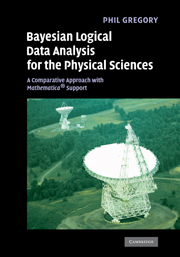 Bayesian Logical Data Analysis for the Physical Sciences
Bayesian Logical Data Analysis for the Physical Sciences Book contents
- Frontmatter
- Contents
- Preface
- Acknowledgements
- 1 Role of probability theory in science
- 2 Probability theory as extended logic
- 3 The how-to of Bayesian inference
- 4 Assigning probabilities
- 5 Frequentist statistical inference
- 6 What is a statistic?
- 7 Frequentist hypothesis testing
- 8 Maximum entropy probabilities
- 9 Bayesian inference with Gaussian errors
- 10 Linear model fitting (Gaussian errors)
- 11 Nonlinear model fitting
- 12 Markov chain Monte Carlo
- 13 Bayesian revolution in spectral analysis
- 14 Bayesian inference with Poisson sampling
- Appendix A Singular value decomposition
- Appendix B Discrete Fourier Transforms
- Appendix C Difference in two samples
- Appendix D Poisson ON/OFF details
- Appendix E Multivariate Gaussian from maximum entropy
- References
- Index
Preface
Published online by Cambridge University Press: 05 September 2012
- Frontmatter
- Contents
- Preface
- Acknowledgements
- 1 Role of probability theory in science
- 2 Probability theory as extended logic
- 3 The how-to of Bayesian inference
- 4 Assigning probabilities
- 5 Frequentist statistical inference
- 6 What is a statistic?
- 7 Frequentist hypothesis testing
- 8 Maximum entropy probabilities
- 9 Bayesian inference with Gaussian errors
- 10 Linear model fitting (Gaussian errors)
- 11 Nonlinear model fitting
- 12 Markov chain Monte Carlo
- 13 Bayesian revolution in spectral analysis
- 14 Bayesian inference with Poisson sampling
- Appendix A Singular value decomposition
- Appendix B Discrete Fourier Transforms
- Appendix C Difference in two samples
- Appendix D Poisson ON/OFF details
- Appendix E Multivariate Gaussian from maximum entropy
- References
- Index
Summary
The goal of science is to unlock nature's secrets. This involves the identification and understanding of nature's observable structures or patterns. Our understanding comes through the development of theoretical models which are capable of explaining the existing observations as well as making testable predictions. The focus of this book is on what happens at the interface between the predictions of scientific models and the data from the latest experiments. The data are always limited in accuracy and incomplete (we always want more), so we are unable to employ deductive reasoning to prove or disprove the theory. How do we proceed to extend our theoretical framework of understanding in the face of this? Fortunately, a variety of sophisticated mathematical and computational approaches have been developed to help us through this interface, these go under the general heading of statistical inference. Statistical inference provides a means for assessing the plausibility of one or more competing models, and estimating the model parameters and their uncertainties. These topics are commonly referred to as “data analysis” in the jargon of most physicists.
We are currently in the throes of a major paradigm shift in our understanding of statistical inference based on a powerful theory of extended logic. For historical reasons, it is referred to as Bayesian Inference or Bayesian Probability Theory. To get a taste of how significant this development is, consider the following: probabilities are commonly quantified by a real number between 0 and 1.
- Type
- Chapter
- Information
- Bayesian Logical Data Analysis for the Physical SciencesA Comparative Approach with Mathematica® Support, pp. xiii - xviPublisher: Cambridge University PressPrint publication year: 2005


